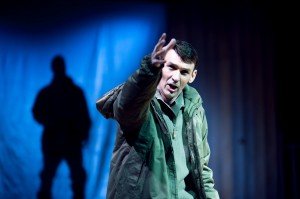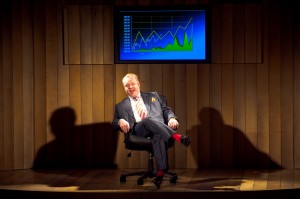Opera Review – Five:15 Operas made In Scotland
* * *
Traverse Theatre
By Thom Dibdin
It was a balmy summer evening in Edinburgh for the opening of Scottish Opera’s third instalment of their project to create short new Scottish operas, but the stage of Traverse One was ice-cold.
Tragedy and loss are the themes running through all five of the operas. None more eloquently expressed than in the big hit of the evening, 74° North involving a ghostly encounter at an icebound grave on Beechy Island.
Composer Paul Mealor, with an electro-acoustic score by Pete Stollery, creates a tense, thrilling setting for Peter Davidson’s libretto. In tones which bring to mind the ambient techno act Biosphere, Stollery’s electronic backdrop creates an image of the frozen wastes where John Franklin’s ill-fated exhibition of the 1840s foundered as he attempted to find the North West passage.
As an expression of mood and place, this is brilliantly done. Jeremy Huw Williams is excellent as a member of the Arctic Survey on his day off at the end of an expedition, with Alexander Grove adding a menacing presence as the ghostly manifestation of a body, 160 years dead but still frozen in the permafrost.
It is harsh, uncompromising music, but easily at one with what it is conveying. The glacial electronica, over-layered with strong percussive elements from the live orchestra and the astringent lines from the singers create a piece which, under Michael McCarthy’s direction, touches human fragility in the face of nature.
Elsewhere, Miriama Young’s score for Alan Spence’s Zen Story has a strong Japanese feel. It is an excellently conceived piece which sees Miranda Sinani’s Girl blame Dean Robinson’s Zen master, Hakuin, for getting her pregnant. And if the flat tones of despair from the girl and her family feel over played, there are flashes of vivid emotion in the score, while Spence’s libretto has a truly enigmatic twist. Great stuff.
Zoe Strachan’s Sublimation has a suitably harsh score by Nick Fells. It tells of a woman walking by a lake with her sister and her young son – the sisters’ memories of their mother intercut with the woman’s flashbacks to her rape, by a similar lake, in a recent war. If the music is hard to listen to and the woman’s situation even harder to bare, this is elegantly staged by Matthew Richardson with dancer Kally Lloyd-Jones providing a visible reference to the ensnaring of the woman’s memories.
Stepping out of the 15 minute format, The Money Man by Ron Butlin (libretto) and Lyel Cresswell (score), is an hour-long opera in development. The three scenes presented in this programme show a piece with much potential but a little work still to do.
The basic plot is great, with Martin Lamb all corpulent and grotesque as Tom Masters, a high-flying financial trader ruined by the collapse in the sub-prime market. Alexander Grove brings a human element as floor trader Steve, who is in love with the Tom’s daughter, Laura, while Louise Collett adds a further comic dimension as pushy journalist Jenna, in love with Tom’s money.
The music provides great colour to the piece, too. Particularly as comic commentary on Masters’ money-grabbing nature. What it lacks are any great tunes. There is space for the music to flow and soar, but it rarely does.
Only in the final piece of the evening The Letter by Bernard MacLaverty, drawn from Vasily Grossman’s Life and Fate, does anything approaching melody really take hold. And that is because of its use of the Jewish chant of Sch’ma that begins and ends the opera, while providing composer Vitaly Khodosh with his central theme.
As opera, it is disturbingly close to the whole evening’s theme. Anna Semyonovna is a Jewish Ukrainian, writing a letter to her son in Moscow as she is rounded up after the German occupation of 1941.
A thoroughly cerebral evening of short operatic pieces. Individually they worked fine, and show some promising areas for future collaboration.
As an evening’s entertainment it was not quite as successful. Had it been one opera, it would have had the benefit of a dramatic arc as its tragedy unfolded. As four distinctly downbeat pieces – with the fifth potentially comic fragment not reaching any real position of levity – there was a lacking of light and shade.
Run continues to Saturday. Transfers to Oran Mor, Tuesday 25-Thursday 27 May.
All online bookings through the Traverse website
ENDS




















